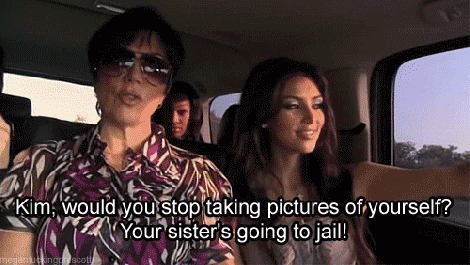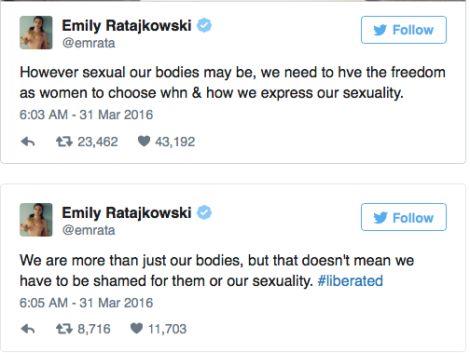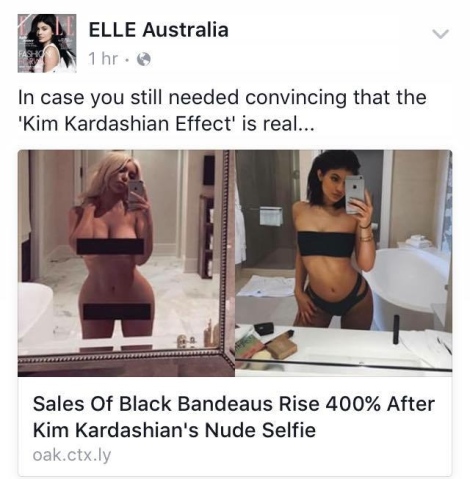Nude selfies: empowering or desperate?
Let’s be real, online self-portraits are everywhere, and the desire’s not new nor exclusive: from Vincent van Gogh’s self portraits, to President Obama’s three-way selfie at Nelson Mandela’s memorial service – we all do it, some, at the worst of times.

mediagiphy.com
Academics link the practice to the construction of our online identity – we reveal personal information online to increase attention and improve our status (Marwick 2015).
So when Kim Kardashian uploaded a nude (but censored) selfie to her 65.9 million followers, it got me thinking why. Was it an expression of self-confidence? Or a mere attempt for attention?

I followed the selfie saga and found that Actress Bette Midler was quick to respond, a 10-metre high mural appeared in Melbourne (only to then be defaced within 24 hours) and Sydney didn’t miss out.

Yikes.
So while some saw the selfie as an aggressive reclaim of the female body (#empowerment #lovemycurves), others saw a shallow expression of online narcissism (Murray 2016). And as expected, Kim was under fire – particularly by British journalist Piers Morgan, who called her out for showing too much skin.
Kim and Em will not be shamed
Model Emily Ratajkowski was quick to defend, posting her own selfie alongside the tweet:


Instagram: @emrata
Kim responded, then decided it was a good idea to take a topless selfie together:

To which Morgan responds with a series of Tweets, telling them to ‘try wearing a little dignity’ – ouch.
So what do we think?
Comments aside, is this a display of female liberation? Or an example of the pressure women feel to display their bodies and sexuality? (Phelan 2016)
Albury (2015) says it’s all to do with sexual self-representation and individual body confidence. But, makes it clear that young men have more freedom because they’re not subject to the same adult surveillance young women’s pictures (and bodies) attract.
Mascheroni (2015) presents similar ideas: that females are more subjected to peer mediation and pressure, a pressure of always looking ‘perfect’ in online pictures.
So it’s a little contradictory; girls who do post provocative photos (perhaps to embrace femininity and sexuality) are choosing to conform to a sexualised stereotype all because they want to be socially accepted by peers – doesn’t sound very liberating to me.
And Albury (2015) agrees. Her participants, both young men and women, admitted that when they did post selfies that displayed their bodies (specifically female cleavage and male six-packs), they did so in pursuit of likes.
Whether its attention seeking or not, Ratajkowski calls for liberation – for the right of women to express and celebrate their sexuality without being chastised (Saul 2016), and it seems online is the place to do it.


‘I am empowered by my sexuality’
Kimmy K calls for liberation too, posting her own personal essay on the matter.
‘I am a mother. I am a wife, a sister, a daughter, an entrepreneur and I am allowed to be sexy.’
But it’s not that simple, as Media Psychologist Dr. Rutledge points out:
‘Kim Kardashian’s nude photos are empowering for her, but exploitive of her audience… She is empowered all the way to the bank. She not only controls her image, she cultivates it. She is a brand.’ – Dr. Rutledge, (Phelan 2016)
And she’s not wrong. Harad (2014) discusses the rise of the attention economy, where ‘Instafamous’ selfies gain currency by capturing the preoccupation of our current generation.
The effects are real, even when endorsement deals aren’t being made – exhibit A:

Facebook: Elle Australia
So what can we conclude?
Tiidenberg and Cruz (2015) view ‘full’ empowerment as the capacity to make meaningful choices, and to act on those choices when interacting with others online.
Kim and Emily stand for body empowerment, for taking control of their image, but you can’t ignore the problematic implications their ‘choices’ can have on wider audiences. Images teach us what moral and aesthetic values are deemed photographable (Tiidenberg & Cruz 2015) – and so, the real power lies in how a simple selfie can influence this and the relationship we have with our own bodies.
And while I’m certainly re-thinking my values, I can assure you, I won’t be posting nude selfies any time soon.
References
Albury, K 2015, ‘Selfies, Sexts, and Sneaky Hats: Young People’s Understandings of Gendered Practices of Self-Representation’, International Journal of Communication, vol.9, p. 1734-1745, viewed 27 March 2016.
Harad, T 2014, ‘I, Me, My Selfie’, Economic & Political Weekly, vol. 49, no. 2, p. 78-79, viewed 27 March 2016.
Mascheroni, G 2015, ‘Girls are addicted to likes so they post semi-naked selfies: Peer mediation, normativity and the construction of identity online’, Cyberpsychology, vol. 9, no. 1, pp. 30-43, viewed 29 March 2016.
Marwick, A 2015, ‘Instafame: Luxury Selfies in the Attention Economy’, Public Culture, vol. 27, no. 1, p. 137-160, viewed 30 March 2016.
Murray, D 2015, ‘Notes to self: the visual culture of selfies in the age of social media’, Consumption Markets & Culture, vol. 18, no. 6, p. 490-516, viewed 25 March 2016.
Phelan, H 2016, ‘Is the Naked Selfie Good for Feminism? Let’s Take a Closer Look,’ Elle, 17 March 2016, viewed 29 March 2016.
Saul, H 2015, ‘Emily Ratajkowski responds to critics who claim her opinions on politics are invalid because of her body’, The Independent, 2 April 2016, viewed 2 April 2016.
Tiidenberg, K & Cruz, E 2015, ‘Selfies, Image and the Re-making of the Body,‘ Body & Society, col. 2, no. 4, p. 77-102, viewed 23 March 2016.